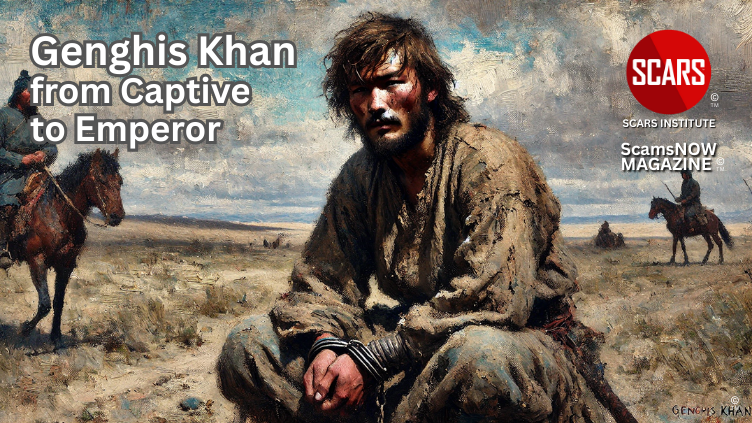From Exile to Empowerment: Genghis Khan’s Journey as a Roadmap for Scam Victim Recovery
What Genghis Khan Can Teach You About Rising from Betrayal
Primary Category: Scam Victim Recovery Philosophy
Intended Audience: Scam Victims-Survivors / Family & Friends
Author:
• Tim McGuinness, Ph.D., DFin, MCPO, MAnth – Anthropologist, Scientist, Polymath, Director of the Society of Citizens Against Relationship Scams Inc.
About This Article
The life of Genghis Khan, often remembered for conquest and empire, begins with betrayal, abandonment, and psychological collapse—an arc that mirrors the emotional journey many relationship scam victims face. Temujin, as he was first known, lost everything early in life: his father, his family’s protection, his clan’s support. He faced exile, captivity, and repeated betrayal. Yet from these ashes, he rebuilt—not instantly, and not without further pain, but with growing clarity, discipline, and purpose.
His transformation from outcast to unifier was not fueled by revenge, but by a vision of something stronger and more resilient than what he had lost. For scam victims, the parallel is striking. Recovery isn’t about forgetting the betrayal or pretending it didn’t happen. It’s about integrating the pain, choosing truth over illusion, and building a new code of self-worth and trust. Like Temujin, you do not rise by erasing your past. You rise by using it. This journey—exile to empowerment, collapse to cohesion—isn’t just historical. It’s personal. And it is still unfolding within you.

From Betrayal to Power: What Genghis Khan’s Story Teaches Scam Victims About Recovery
Introduction
The life of Genghis Khan—born as Temujin—is an extraordinary arc of loss, betrayal, survival, and eventual triumph that mirrors, in metaphorical terms, the emotional trajectory many relationship scam victims experience. His story offers a powerful lens through which you can explore themes of devastation, isolation, resilience, and rebuilding from a place of deep personal collapse.
Temujin began life in a stable nomadic tribe, surrounded by family and alliances, not unlike the emotional baseline many victims come from. That security was shattered when his father was betrayed and poisoned by rivals. His family was cast out, left to starve in the harsh Mongolian wilderness, abandoned by those who once pledged loyalty. This period of betrayal and abandonment mirrors what scam victims often feel—the collapse of a world they thought they understood.
Temujin’s journey back from that devastation wasn’t swift or straightforward. It involved captivity, hardship, and repeated betrayals, including by sworn blood brothers like Jamukha. This echoes the betrayal scam victims endure—not just the scam itself, but the disbelief, judgment, and abandonment that can follow when they seek help.
What makes Genghis Khan’s story resonate so deeply is not his conquest, but how he built strength from vulnerability. He forged new alliances, learned from every failure, and reshaped his identity—not around vengeance, but vision. He created order from chaos, discipline from disorder, and trust where there had been only fear. That’s the same kind of internal architecture scam victims are challenged to rebuild.
Just as Genghis Khan unified fragmented tribes into a powerful, resilient empire, scam victims can unify their fragmented identities, rebuild their inner coherence, and come to live with strength and clarity. His story is not one of mythic heroism alone—it is one of transformation earned through suffering, strategy, and persistence. That is a narrative every victim can claim as their own.
The Khan
In the annals of history, few names evoke as much awe and controversy as Genghis Khan. Known for uniting the fractured tribes of Mongolia and creating the largest contiguous empire the world has ever seen, Genghis Khan’s rise from obscurity is more than just a tale of military conquest. It is a story of trauma, betrayal, exile, perseverance, and eventual self-reinvention. When viewed through the lens of emotional and psychological recovery, especially for those who have survived relationship scams, his life reads less like myth and more like metaphor.
You may never ride horseback across the steppe or lead armies into battle, but if you’ve experienced the devastation of betrayal, the collapse of trust, and the painful road back to self-worth, then you already understand Temujin’s journey. This is not just a story of a conqueror. It is a story of someone who lost everything—and chose to rebuild.
The Khan’s Early Years: A Foundation of Trust
Temujin, later known as Genghis Khan, was born into a Mongol clan in the 12th century. His early years were not glamorous, but they were stable. He was raised in a tight-knit nomadic society governed by clan loyalty, mutual protection, and familial bonds. In this world, honor and obligation held deep meaning.
This initial environment mirrors the emotional baseline many scam victims remember before their betrayal. You may recall the time before the scam as relatively grounded. Maybe you trusted easily, felt a sense of belonging, or held to beliefs that people, by and large, mean well. Like young Temujin, you probably believed in the strength of relationships—until betrayal stripped that belief away.
The Betrayal: Loss and Abandonment
When Temujin was around nine years old, his father was poisoned by a rival tribe. The impact was immediate and catastrophic. His family, no longer politically useful, was abandoned by their own clan. Exiled into the harsh Mongolian wilderness, Temujin, his mother, and his siblings faced starvation, exposure, and the brutal knowledge that those they had trusted had left them to die.
This is a reality you may know too well. The betrayal of a scam isn’t just about the con itself—it’s about the emotional exile that follows. People you thought would stand by you may have turned away. You may have found yourself alone, confused, shamed, and stripped of your previous identity. The question “How could this happen?” turns inward, and the grief becomes not only about what was taken, but what was lost in your self-image.
Temujin’s pain was raw and real. But even then, he began to rebuild.
Survival as the First Victory
Temujin did not rally armies immediately. He didn’t have power, resources, or even protection. His first triumph was simply survival. He hunted small game to feed his family. He avoided rival raiders. He endured. It was not glorious. It was not recognized. But it was the first act of resistance against the betrayal he had suffered.
Your first steps in recovery may look the same. Maybe you’re not “thriving” yet. But you’re still here. You’re breathing. You’re finding your footing again. In those early days of pain, your survival is a statement: You did not win. I am still here. That alone is powerful.
Captivity and Escape: Learning While in Chains
As a teenager, Temujin was captured by a rival tribe and held as a slave. This, too, parallels the experience of scam victims. Not only were you betrayed—you were psychologically held hostage. Maybe you couldn’t walk away right away. Maybe you kept talking to the scammer even after seeing red flags. Maybe you were waiting for the story to change, for an apology, for resolution. That emotional captivity is a trap many victims know well.
Temujin escaped. Not with violence, but with cunning. He waited, observed, and found an ally in an unexpected place. This speaks to one of the hardest truths in recovery: you may have to outthink your pain before you can outpace it. Escape requires insight. Who are your allies? What options do you have? Where is the crack in the wall?
Your escape may not be dramatic, but it is a turning point. The day you delete the contact. The day you stop waiting for closure. The day you walk into a support group. That’s your escape.
Betrayal Repeats: The Wound Reopens
After rejoining society, Temujin built alliances with fellow warriors—including his blood brother, Jamukha. For a time, they rose together. But power and envy created a rift. Jamukha betrayed Temujin, leading to the slaughter of his men and the deepening of a lifelong wound.
You may find that your path to healing is also interrupted by new betrayals—people who don’t believe you, friends who distance themselves, others who question your judgment. This retraumatization is common. It reopens wounds and makes you question whether trust is ever safe again.
Temujin didn’t let betrayal define him. He let it inform him. He learned. He adjusted. He didn’t stop building.
The Rebuild: Choosing Purpose Over Pain
Temujin began forming a new code—one based not on bloodline but on loyalty, discipline, and shared values. He started attracting those who had also been marginalized or betrayed. He created unity not by erasing pain but by channeling it. His warriors weren’t just fighting for conquest. They were fighting for a world built on a different kind of order.
This is what recovery can look like when you stop defining yourself by what happened to you and start building something new. Maybe you volunteer. Maybe you become an advocate. Maybe you commit to healing not just for yourself, but for others. You use what happened not to destroy others—but to rebuild community with intention and clarity.
You create your own code. No more secrecy. No more emotional self-abandonment. No more false narratives.
The Empire Within: Triumph as Integration
Genghis Khan’s eventual rise wasn’t just military. It was psychological. He took the shattered pieces of his early life and forged a new identity. He didn’t erase his past. He integrated it.
That’s what real recovery does. It doesn’t delete the trauma. It gives it context. It says: Yes, this happened. And yes, I am more than what happened.
Triumph, for you, might not mean conquest (though if you want to go there, learn to ride and buy a furry hat.) It means living with wholeness. Feeling joy without suspicion. Trusting with discernment. Making peace with your past without being ruled by it.
Your Journey: From Exile to Empowerment
The story of Genghis Khan is not about becoming someone else. It’s about becoming more fully yourself—through fire, through failure, and through fierce honesty. His life proves that your lowest moment does not determine your destiny.
In other words, it is about becoming the baddest bad ass you can be!
You may have been cast out. Lied to. Left behind. But you are not finished. Like Temujin, you are still in motion. Still building. Still capable of turning betrayal into purpose.
You are allowed to be angry. You are allowed to grieve. But you are also allowed to rise.
Conclusion
The arc of recovery is not linear. It moves through devastation, stagnation, resurgence, and eventually redefinition. Genghis Khan’s story, stripped of the military epic, is a deeply human one. It mirrors the inner architecture of someone betrayed, someone shamed, someone broken—and someone who refuses to stay that way.
Let that be your model. You don’t need to conquer the world. You just need to reclaim your place in it. Not as a victim. Not even as a survivor. But as someone who chose to rebuild where everything once fell apart – we call these ‘Thrivers’.
You were betrayed—but you are not defeated. Your strength isn’t in how much you feel. It’s in how often you rise. Just like Temujin. Just like Genghis Khan. Just like you.
Reference
Genghis Khan: A Brief Biography
Genghis Khan, born as Temujin around 1162 in the steppes of Mongolia, was the founder and first Great Khan of the Mongol Empire, which became the largest contiguous land empire in history. His early life was marked by extreme hardship: his father was poisoned by rival clans, and his family was abandoned and left to starve by their own tribe. Temujin endured exile, betrayal, and the brutal realities of tribal warfare, but through determination, strategic alliances, and personal resilience, he gradually rose to power.
In 1206, he united the Mongol tribes and was proclaimed Genghis Khan, meaning “universal ruler.” Over the next two decades, he led sweeping military campaigns across Central Asia, China, and Eastern Europe, known for their scale and ruthlessness, but also for innovations in military strategy, governance, and communication. Genghis Khan promoted meritocracy, religious tolerance, and a sophisticated legal code known as the Yassa.
He died in 1227 under circumstances still debated by historians, but his legacy continued through his descendants, who expanded the empire even further. More than a conqueror, Genghis Khan was a transformative leader who rose from personal devastation to reshape the known world.
You Might be a Mongol Yourself
Genetic studies suggest that approximately one in 200 men worldwide—or about 0.5% of the global male population—carry a Y-chromosome lineage tracing back to a single common ancestor from around 1,000 years ago. This lineage is believed to originate from the region of the former Mongol Empire and is widely attributed to Genghis Khan, based on its high frequency in areas once under his control .
This genetic legacy is particularly prevalent in Central Asia. For instance, about 8% of men in the region encompassing the former Mongol Empire share this Y-chromosome lineage . This widespread genetic imprint is thought to result from the extensive conquests and the subsequent expansion of Genghis Khan’s male descendants, who held power across vast territories and had numerous offspring over successive generations.
While the exact number of individuals carrying this genetic marker today is difficult to determine, estimates suggest that tens of millions of people worldwide may be direct male-line descendants of Genghis Khan. This remarkable genetic influence underscores the profound and lasting impact of the Mongol Empire on the human gene pool.
-/ 30 /-
What do you think about this?
Please share your thoughts in a comment below!
Statement About Victim Blaming
SCARS Institute articles examine different aspects of the scam victim experience, as well as those who may have been secondary victims. This work focuses on understanding victimization through the science of victimology, including common psychological and behavioral responses. The purpose is to help victims and survivors understand why these crimes occurred, reduce shame and self-blame, strengthen recovery programs and victim opportunities, and lower the risk of future victimization.
At times, these discussions may sound uncomfortable, overwhelming, or may be mistaken for blame. They are not. Scam victims are never blamed. Our goal is to explain the mechanisms of deception and the human responses that scammers exploit, and the processes that occur after the scam ends, so victims can better understand what happened to them and why it felt convincing at the time, and what the path looks like going forward.
Articles that address the psychology, neurology, physiology, and other characteristics of scams and the victim experience recognize that all people share cognitive and emotional traits that can be manipulated under the right conditions. These characteristics are not flaws. They are normal human functions that criminals deliberately exploit. Victims typically have little awareness of these mechanisms while a scam is unfolding and a very limited ability to control them. Awareness often comes only after the harm has occurred.
By explaining these processes, these articles help victims make sense of their experiences, understand common post-scam reactions, and identify ways to protect themselves moving forward. This knowledge supports recovery by replacing confusion and self-blame with clarity, context, and self-compassion.
Additional educational material on these topics is available at ScamPsychology.org – ScamsNOW.com and other SCARS Institute websites.
-/ 30 /-
What do you think about this?
Please share your thoughts in a comment below!
Important Information for New Scam Victims
- Please visit www.ScamVictimsSupport.org – a SCARS Website for New Scam Victims & Sextortion Victims.
- SCARS Institute now offers its free, safe, and private Scam Survivor’s Support Community at www.SCARScommunity.org – this is not on a social media platform, it is our own safe & secure platform created by the SCARS Institute especially for scam victims & survivors.
- SCARS Institute now offers a free recovery learning program at www.SCARSeducation.org.
- Please visit www.ScamPsychology.org – to more fully understand the psychological concepts involved in scams and scam victim recovery.
If you are looking for local trauma counselors, please visit counseling.AgainstScams.org
If you need to speak with someone now, you can dial 988 or find phone numbers for crisis hotlines all around the world here: www.opencounseling.com/suicide-hotlines
Statement About Victim Blaming
Some of our articles discuss various aspects of victims. This is both about better understanding victims (the science of victimology) and their behaviors and psychology. This helps us to educate victims/survivors about why these crimes happened and not to blame themselves, better develop recovery programs, and help victims avoid scams in the future. At times, this may sound like blaming the victim, but it does not blame scam victims; we are simply explaining the hows and whys of the experience victims have.
These articles, about the Psychology of Scams or Victim Psychology – meaning that all humans have psychological or cognitive characteristics in common that can either be exploited or work against us – help us all to understand the unique challenges victims face before, during, and after scams, fraud, or cybercrimes. These sometimes talk about some of the vulnerabilities the scammers exploit. Victims rarely have control of them or are even aware of them, until something like a scam happens, and then they can learn how their mind works and how to overcome these mechanisms.
Articles like these help victims and others understand these processes and how to help prevent them from being exploited again or to help them recover more easily by understanding their post-scam behaviors. Learn more about the Psychology of Scams at www.ScamPsychology.org
SCARS INSTITUTE RESOURCES:
If You Have Been Victimized By A Scam Or Cybercrime
♦ If you are a victim of scams, go to www.ScamVictimsSupport.org for real knowledge and help
♦ SCARS Institute now offers its free, safe, and private Scam Survivor’s Support Community at www.SCARScommunity.org/register – this is not on a social media platform, it is our own safe & secure platform created by the SCARS Institute especially for scam victims & survivors.
♦ Enroll in SCARS Scam Survivor’s School now at www.SCARSeducation.org
♦ To report criminals, visit https://reporting.AgainstScams.org – we will NEVER give your data to money recovery companies like some do!
♦ Follow us and find our podcasts, webinars, and helpful videos on YouTube: https://www.youtube.com/@RomancescamsNowcom
♦ Learn about the Psychology of Scams at www.ScamPsychology.org
♦ Dig deeper into the reality of scams, fraud, and cybercrime at www.ScamsNOW.com and www.RomanceScamsNOW.com
♦ Scam Survivor’s Stories: www.ScamSurvivorStories.org
♦ For Scam Victim Advocates visit www.ScamVictimsAdvocates.org
♦ See more scammer photos on www.ScammerPhotos.com
You can also find the SCARS Institute’s knowledge and information on Facebook, Instagram, X, LinkedIn, and TruthSocial
Psychology Disclaimer:
All articles about psychology and the human brain on this website are for information & education only
The information provided in this and other SCARS articles are intended for educational and self-help purposes only and should not be construed as a substitute for professional therapy or counseling.
Note about Mindfulness: Mindfulness practices have the potential to create psychological distress for some individuals. Please consult a mental health professional or experienced meditation instructor for guidance should you encounter difficulties.
While any self-help techniques outlined herein may be beneficial for scam victims seeking to recover from their experience and move towards recovery, it is important to consult with a qualified mental health professional before initiating any course of action. Each individual’s experience and needs are unique, and what works for one person may not be suitable for another.
Additionally, any approach may not be appropriate for individuals with certain pre-existing mental health conditions or trauma histories. It is advisable to seek guidance from a licensed therapist or counselor who can provide personalized support, guidance, and treatment tailored to your specific needs.
If you are experiencing significant distress or emotional difficulties related to a scam or other traumatic event, please consult your doctor or mental health provider for appropriate care and support.
Also read our SCARS Institute Statement about Professional Care for Scam Victims – click here
If you are in crisis, feeling desperate, or in despair, please call 988 or your local crisis hotline – international numbers here.
More ScamsNOW.com Articles
A Question of Trust
At the SCARS Institute, we invite you to do your own research on the topics we speak about and publish. Our team investigates the subject being discussed, especially when it comes to understanding the scam victims-survivors’ experience. You can do Google searches, but in many cases, you will have to wade through scientific papers and studies. However, remember that biases and perspectives matter and influence the outcome. Regardless, we encourage you to explore these topics as thoroughly as you can for your own awareness.















![NavyLogo@4x-81[1] From Exile to Empowerment: Genghis Khan’s Journey as a Roadmap for Scam Victim Recovery - 2025](https://scamsnow.com/wp-content/uploads/2025/04/NavyLogo@4x-811.png)










![scars-institute[1] From Exile to Empowerment: Genghis Khan’s Journey as a Roadmap for Scam Victim Recovery - 2025](https://scamsnow.com/wp-content/uploads/2025/04/scars-institute1.png)

![niprc1.png1_-150×1501-1[1] From Exile to Empowerment: Genghis Khan’s Journey as a Roadmap for Scam Victim Recovery - 2025](https://scamsnow.com/wp-content/uploads/2025/04/niprc1.png1_-150x1501-11.webp)